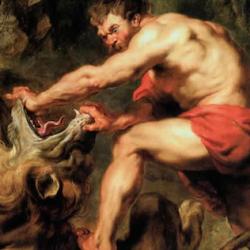Writing in the Bible Review for June 2004, one Dan Clanton suggests that our perceptions of Delilah and the Samson/Delilah story arise more from art than from Scripture. He particularly contrasts the biblical account with the opera of Saint-Saens.
According to Clanton’s reading of the biblical story, “Samson is a ladies’ man, a bumbling oaf and a brute,” so bad that “it is difficult to understand why Samson is included among the biblical judges.” By contrast, “Saint-Saens’s male lead is no foolhardy ladies’ man, weakened by love. Instead, he is a prophet, a military champion and a priest with great depth and dignity,” who calls the people to renew their trust in Yahweh. Further, Saint-Saens portrays the Samson/Delilah story as a religious conflict, “a rivalry between competing religions.” When Abimelech of Gaza questions the power of Yahweh in comparison with the power of Dagon, Samson slays him. (According to Clanton, Abimelech’s name is borrowed from Genesis 26:1; but Saint-Saens knew what he was doing, since Abimelech [“my father is king”] could well be a title rather than a name.) Saint-Saens also has a priest, a religious leader approach Delilah about trying to capture Samson: “This alteration is significant,” Clanton writes, “because . . . it contributes to the thematic thrust of the opera, in which Saint-Saens emphasizes the religious conflict submerged in the biblical story.” (Again, Saint-Saens’s treatment is perfectly defensible; he seems to have been a decent ancient historian, who perhaps knew that priesthood and kingship was rarely separated in the ANE.)
One last contrast that Clanton brings out: In Judges, Samson dies taking revenge for “these two eyes,” but Saint-Saens transforms this too into a religious theme: While Samson is being mocked, Delilah comes forward to boast that she has avenged her god, her people, and her hatred [for Samson].” The high priest claims that if Samson could receive his sight back, he, the priest, would worship Yahweh, and then proceeds to scoff at Samson’s god. Samson is angered by the blasphemy: “As the high priest and Delilah begin to make offerings to Dagon, and as the Philistines rejoice, Samson again asks God to let him avenge both himself and God. With a loud cry, he pushes the pillars down, and the temple comes crashing in on everyone. Thus the opera ends.”
Overall, in Saint-Saens’s presentation, “Samson is very much the representative of God. He speaks for God and even sacrifices himself for God. The operatic Samson seems far more devout than his biblical predecessor, who hardly ever seems to think or talk about God and who sacrifices himself (along with numerous Philistines) for personal vengeance.”
On nearly every point, I find myself in agreement with Saint-Saens against Clanton. Saint-Saens was not changing the Samson story, but offering a compelling reading of the text. The opera is an example, not uncommon, of a “non-scholar” reading better than a scholar.















